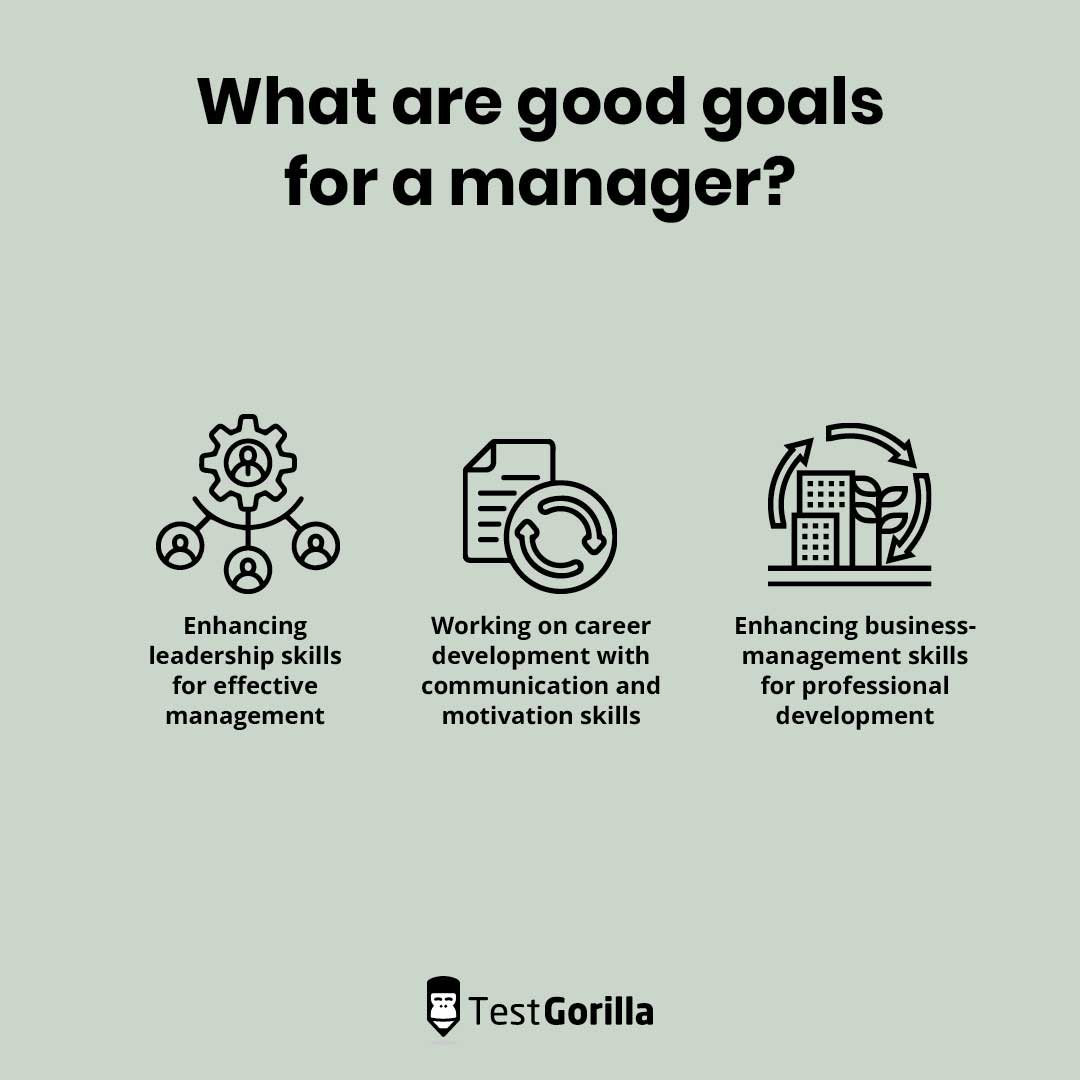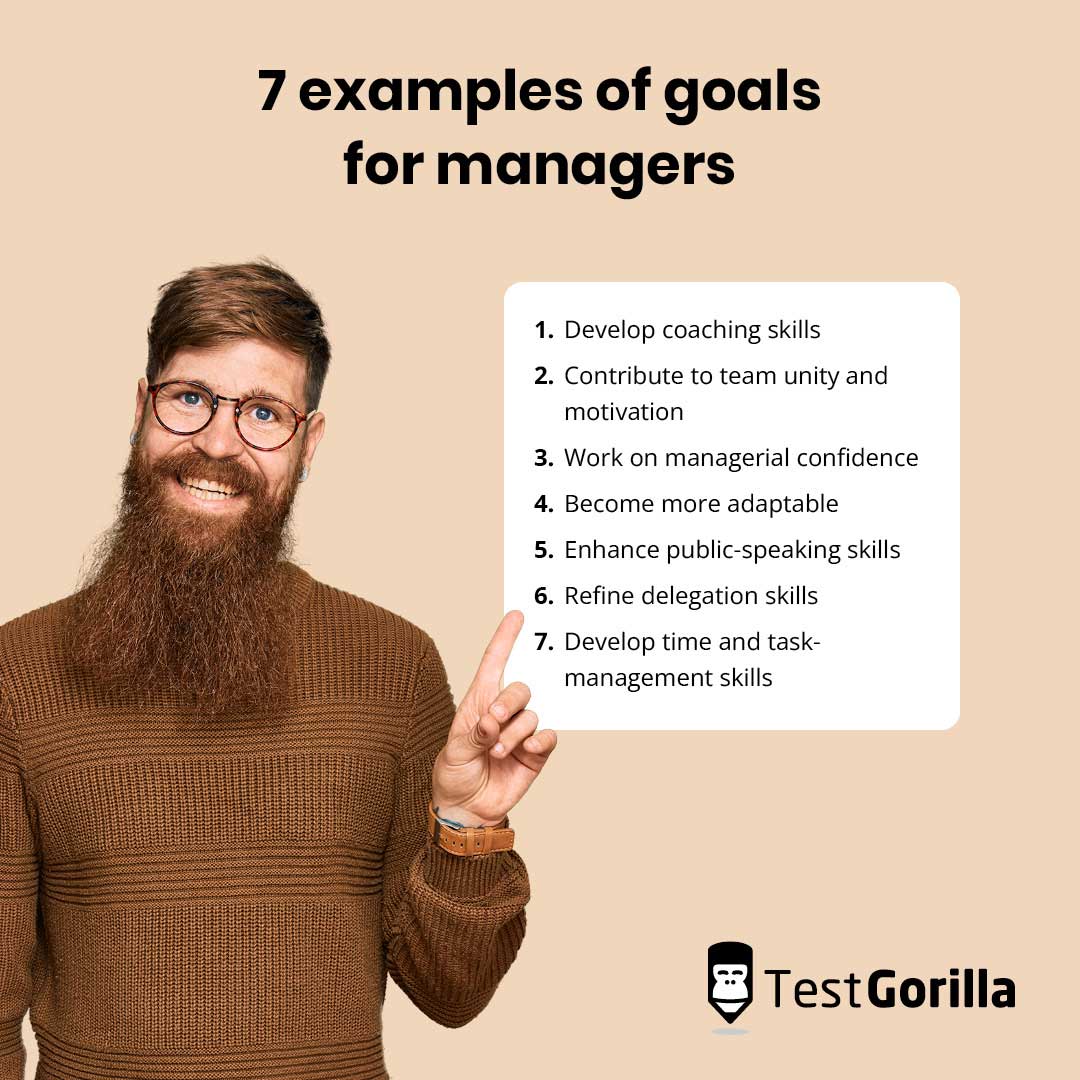Professional development: 7 examples of goals for managers
Professional development for managers is critical for your business and its teams. Managers who continuously strive to improve their abilities are more likely to lead more efficiently and ensure their team members are productive.
But which goals for managers are essential for their professional development? This article reviews and explores the key examples.
What are good goals for a manager, and how can you ensure managers can achieve them?
As well as setting goals for teams, there are a variety of goals your managers should consider to improve productivity and optimize their teams. Read through the following examples of goals for managers and learn how your managers can achieve them.
Enhancing leadership skills for effective management
Managerial development involves enhancing core leadership skills. Your managers must know how to think strategically, endorse and encourage positive thinking, work with underachievers, and embrace company changes.
Improving each sub-skill will contribute to effective professional management development. But what’s the best way to ensure a manager can develop them?
A Leadership and People Management skills test will help you benchmark a manager’s leadership skills and plan methods to enhance these sub-skills. For example, if the test results indicate your manager lacks skills in planning and supporting the development of team members, you may consider running a refresher training course to improve these.
Working on career development with communication and motivation skills
Your managers must understand how they can enhance their career growth by developing communication and motivation skills with effective methods and support.
For example, a manager may want to become a better active listener or find ways to delegate and motivate more efficiently.
To ensure your managers actively work on these skills as a way to enhance their career development, first assess the specific skills they need to develop. Review their active listening skills with a Communication skills test, or check their motivation with a Motivation test. Afterward, you and senior management can work with the manager to create a development plan with top training programs.
Enhancing business-management skills for professional development
To work on managerial development, your managers may aim to enhance their business-management and judgment sub-skills – another one of the many examples of goals for managers. How can you help a manager achieve exceptional business management skills?
Our Business Judgment test will review your manager’s level of expertise and guide you with the training programs you wish to develop. From strategy and innovation to performance improvement, there are plenty of business management sub-skills your manager can develop if they know which are their weaker skills and complete training programs accordingly.
7 examples of goals for managers
There are many specific examples of goals for managers to help them improve efficiency and work on professional development. Here are seven you may consider.
1. Develop coaching skills
A hallmark of top managers is their coaching skills. These skills enable managers to offer suitable guidance and support, ensuring their team members are engaged, loyal, and goal-driven employees. If your manager lacks coaching skills, honing this ability should be a professional development goal they wish to pursue
2. Contribute to team unity and motivation
Does your manager have the ability to enhance team unity and drive motivation? If this is one of their less-developed skills, they should consider refining it to enhance the productivity of their teams and the wider business. To build exceptional motivation skills, they need the right motivational mindset themselves, which you can test with a Motivation test.
3. Work on managerial confidence
With the right confidence, your managers can enhance the trust between team members and encourage employees to approach them if they require any extra support.
You can check whether confidence is an intrinsic part of your manager’s character with several personality tests, such as the Enneagram test. With the results, you can decide if confidence should be a top priority for perfecting your managers’ leadership skills
4. Become more adaptable
Can your manager adapt to change? Adaptability is a crucial skill that enables managers to see change as an opportunity for positive development. If your manager isn’t adaptable, put this trait on their radar for professional development.
5. Enhance public-speaking skills
Leading a team requires excellent public-speaking skills to deliver instructions, provide feedback, and share information with a department or team. The best managers will aim to enhance their public-speaking skills as, when they speak, they are demonstrating leadership and gaining credibility as a leader.
With a Communication skills test, you can evaluate your managers’ public-speaking skills and create a training plan for professional development.
6. Refine delegation skills
Reviewing your managers’ delegation skills and checking they are at the required level will help you notice whether they have the skills to manage tasks, projects, and teams. Your managers should prioritize delegation skill enhancement as part of their professional development to ensure the optimization of the business’s workflow and daily operations.
7. Develop time and task-management skills
With top time and task-management skills, managers can further optimize the workflow for team members. Check your managers’ time-management skills with a Time Management test, use the results as a benchmark, and create training programs to help them work on this skill set.
The best insights on HR and recruitment, delivered to your inbox.
Biweekly updates. No spam. Unsubscribe any time.
2 additional management goal examples to focus on
Two additional types of management goals are operational and superordinate goals. Since getting better at these responsibilities is an essential part of professional development for managers, let’s look at examples of these types of management goals in more detail.
What are operational goals in management, and who establishes them?
Operational goals in management are objectives that affect how managers and employees run a business and provide a framework for delineating roles and duties. Lower management levels adopt these goals, aiming to determine and maximize each employee’s responsibilities, performance, and impact on the organization.
To ensure your managers can work on their operational goals for your business, ensure they have good strategic planning and decision-making skills.
What are superordinate goals in management, and who establishes them?
Superordinate goals in management involve motivating team members in different departments of a business. Managers set these goals to resolve employee conflicts and enhance employee relationships. For instance, setting and enforcing superordinate goals involves rewarding employees when they achieve their targets.
To ensure your manager can handle superordinate goals for your business, resolve conflicts, and boost employee relationships, ensure they have suitable problem-solving and critical-thinking skills with our Critical Thinking test.
Help your managers hone in on their skills with skills testing
Professional development for management is vital to ensure your organization continues on an upward performance trajectory. Make sure your managers are working on their professional development and assist them by benchmarking their skills with the right skills tests.
Go to TestGorilla for a comprehensive range of tests, and get going with top professional development. Register for free today.
Recommended reading: Unleash employee potential with these personal professional development examples
Related posts
You've scrolled this far
Why not try TestGorilla for free, and see what happens when you put skills first.
















